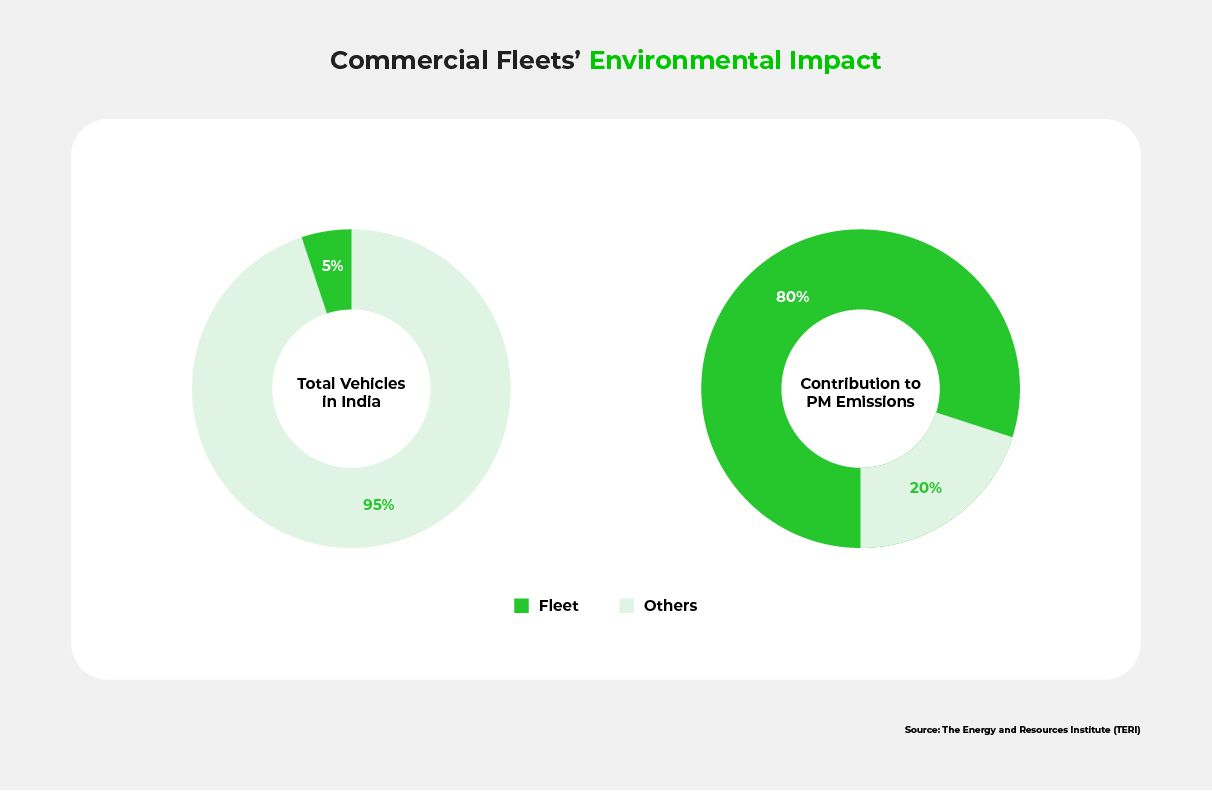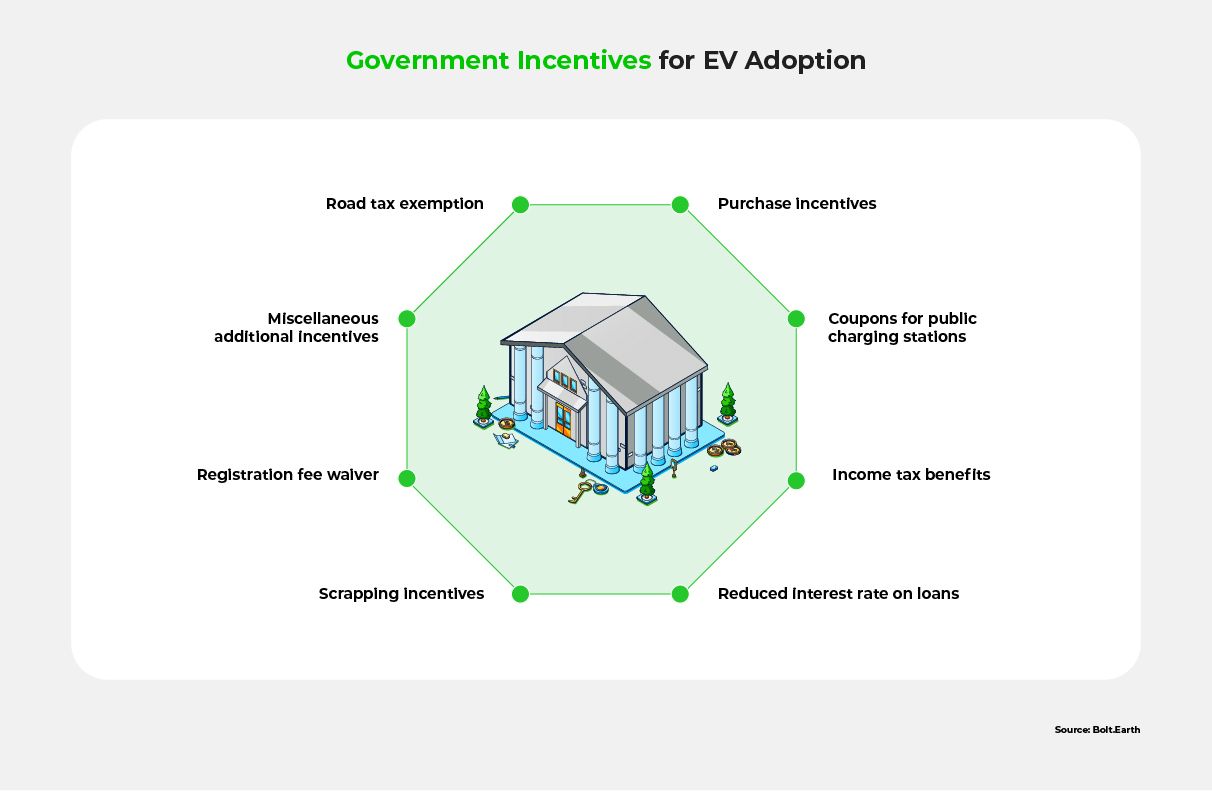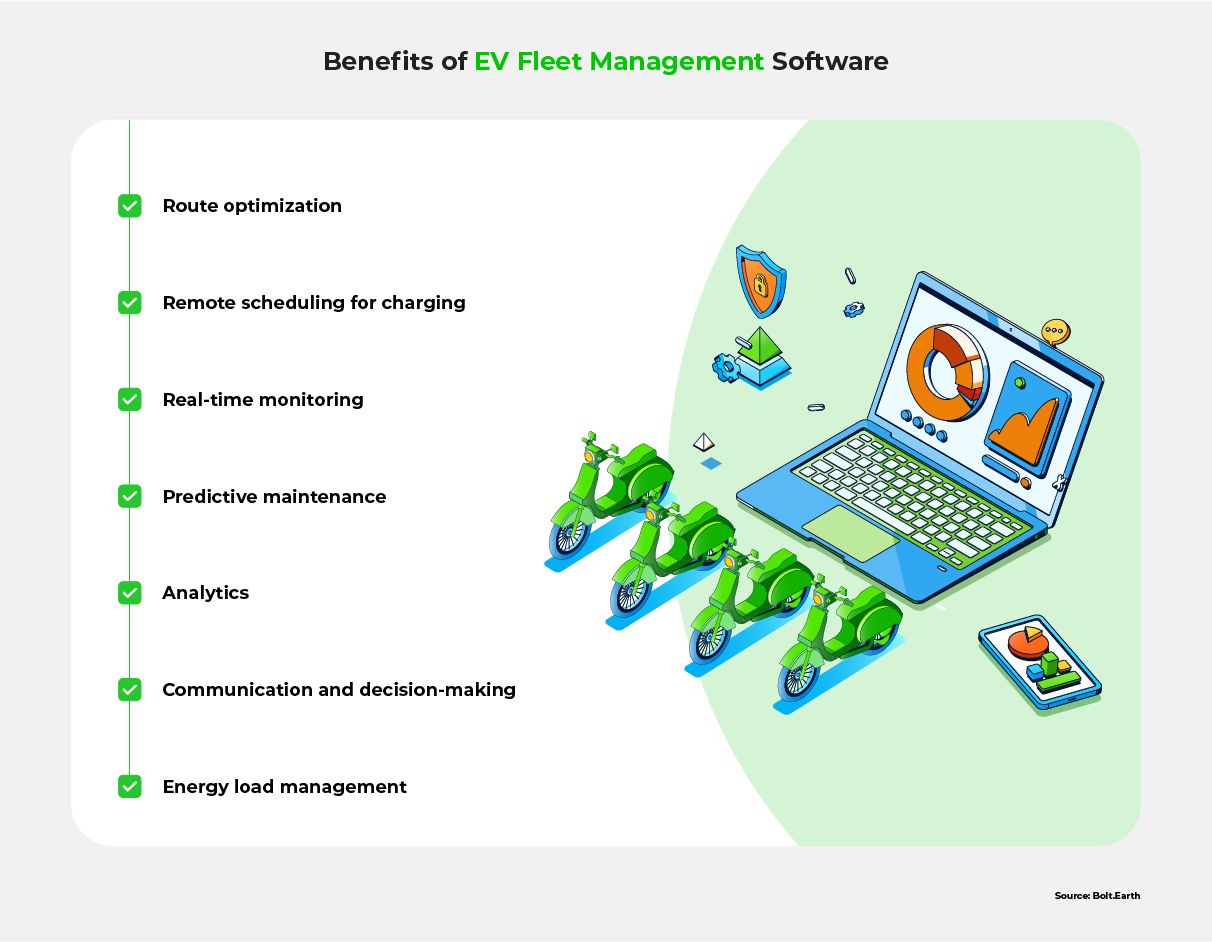The Role of EVs in Corporate Fleets in India (2025 Update)
Raghav Bharadwaj
Chief Executive Officer
Published on:
13 Jul, 2023
Updated on:
24 Dec, 2025

India’s corporate fleets are rapidly electrifying, driven by government incentives, falling battery costs, and rising ESG commitments. EVs now account for over 2 million registered vehicles nationwide, with corporate adoption accelerating in logistics, ride-hailing, and delivery services.
EVs are an environmentally friendly alternative to traditional vehicles because they produce zero tailpipe emissions and have a low carbon footprint. By transitioning to EVs, corporate fleets can reduce greenhouse gas emissions, air pollution, and fossil fuel dependence, thereby contributing to a cleaner environment. EVs are also a financially beneficial option in India; government subsidies and low-cost funding options bring down capital costs, and growing awareness among consumers drives demand for EV fleets.
Fleet operators are on the cusp of creating history by shifting to EVs in their corporate fleets. This will help them gain substantial economic benefits while laying the groundwork for sustainable transportation in India.
To help companies transition to green fleets, this article answers the following questions:
- Why should corporate fleets shift to EVs?
- What are the potential challenges of introducing EVs into corporate fleets, and what solutions can ease the transition?
- How can large corporations use fleet management software to maintain large EV fleets efficiently?
The Urgent Need for EV Adoption in Corporate Fleets
Commercial fleets, consisting of buses, trucks, and light commercial vehicles such as minivans, account for only 6% of India’s total vehicles. However, they are responsible for nearly 75% of India’s total particulate matter (PM) emissions.
Given that Indian cities are among the most polluted in the world, governmental institutions are prioritizing shifting to EVs to reduce pollution levels. For example, several state governments have committed to electrifying public buses.

Many fleet operators are also taking on the social responsibility of creating a clean environment. To this end, they are investing heavily in EVs to bring down their carbon footprint and operational costs.
BigBasket, a company that delivers groceries and kitchen goods, plans to electrify 90% of its fleet. Amazon and Flipkart are also pushing for greater electrification. BluSmart, a ride-hailing company based in Gurugram, uses only EVs in its fleet; it has over half a million customers so far, and anticipates becoming profitable by the end of 2023.
Switching to EVs comes with economic gains for corporate fleets, not just environmental benefits. For example, BluSmart estimates that its current running cost, which is INR 1.4 per kilometer, will drop below INR 1 per kilometer with the addition of 40,000 to 50,000 new EVs over the next year and a half.
This is 4 to 5 times cheaper than operating compressed natural gas (CNG) cars, and a staggering 8 to 9 times cheaper than operating petrol or diesel cars. In other words, by adopting EVs, corporate fleets can increase their profits by reducing operational costs.
That said, fleet operators face several challenges and barriers to EV adoption.
Key Challenges for Corporations in Adopting EVs
Corporate fleets face many obstacles in transitioning to EVs, including high upfront costs, inadequate infrastructure, and limited battery range. Understanding these challenges is essential to developing effective strategies to achieve a more sustainable future by accelerating and facilitating EV adoption.
High Upfront Costs
Corporations transitioning to EV fleets must start by grappling with high upfront costs. EV batteries, which contain rare earth elements and are therefore significantly more expensive than petrol and diesel vehicles’ internal combustion engines, account for about 40% of the total costs. EV adoption also requires fleet companies to invest in charging infrastructure.
These high upfront costs can create resistance from stakeholders. Fleet managers and drivers may be unwilling to make the financial commitment, and decision-makers may be skeptical that the ROI will justify the initial investment. Factors like range anxiety and discomfort with unfamiliarity can lead to further friction.
To overcome these high costs, fleet companies are using a combination of financing options. Leasing agreements enable companies to acquire EVs every month, without paying the full cost up front. Partnerships with automakers help EV fleet owners get support for charging. In addition, attracting investments from venture capitalists can cover the upfront costs without burdening the organization.
Many corporations have used these financial models to transition to EV fleets. For example, Zyngo, an EV logistics company, has raised funding from Delta Corp Holdings to increase its EV fleet. Similarly, Uber has partnered with Lithium Urban Technologies, Moove, and Everest Fleet to deploy 25,000 EVs across seven cities in India.
Lack of Charging Infrastructure
The existing charging infrastructure in India is inadequate, in terms of both coverage and capacity. India now has over 12,000 public charging stations, but rural coverage remains sparse. Charger incompatibility compounds the issue, since drivers have to find a station that supports their vehicle. As a result, EV charging stations’ unreliability and inaccessibility hamper corporate fleets’ ability to plan operations, reduce downtime, and enhance the overall efficiency of their operations.
Given that fleets must adhere to strict schedules, drivers may be hesitant to take on the additional burden of finding charging stations, especially if they have to service semi-urban and rural areas. Since EVs require frequent charging, sometimes at multiple points during the same journey, drivers’ range anxiety impedes the adoption of EVs in corporate fleets.
Strategies for Adopting EVs in Corporate Fleets in India
Addressing the challenges and boosting the adoption of EVs in corporate fleets requires a collaborative effort from governments, automakers, EV startups, fleet operators, drivers, and other stakeholders in the EV ecosystem. Every stakeholder stands to gain from the transition to EVs tomorrow, but only if they all work together today. Government incentives, collaboration among public and private entities, and innovation from startups are especially critical to the transition to green fleets.
Government Incentives
The Indian government is currently offering the following incentives:
- Purchase incentives: Direct discount to the owner
- Coupons: Credits on public charging stations
- Interest discounts: Reduced interest rate on loans
- Road tax exemption: The road tax is waived
- Registration fee waiver: The one-time cost of registration is waived
- Income tax benefit: GST on EVs remains at 5% (vs. 28% for ICE vehicles)
- Scrapping incentives: Financial discounts are offered for deregistering old diesel and petrol vehicles
- State-level perks: Many state governments, including Maharashtra, are specifically incentivizing fleet operators to shift to EVs by reducing upfront purchase costs. The incentive application process is often handled by EV dealers, so fleet operators are spared from investing additional time and effort.

Collaboration Between Public and Private Entities
Public-private partnerships help develop and expand charging infrastructure, thereby working towards alleviating range anxiety. Typically, the government encourages private companies to set up charging stations in rural areas, compensating them for revenue for a limited tenure. Such efforts can reduce range anxiety and increase acceptance among fleet managers and EV drivers.
Startups Driving Innovation in EV Fleet Solutions
Innovative startups are developing game-changing technologies and solutions to help companies integrate EVs into their corporate fleets. Much of this innovation involves battery technology and EV fleet management software. In particular, innovative fleet management software systems have improved the efficiency, reliability, and overall performance of EV fleets by enabling lower operational costs, which, in turn, can lead to wider adoption.
Leveraging Fleet Management Software for Green Fleets
EV-specific fleet management software helps streamline operations for corporate fleets.

Key features for efficient EV fleet operations include:
Route Optimization
EV software can optimize routes to reduce travel time, minimize charging stops, and enhance fleet efficiency.
Remote Scheduling for Charging
Apps can enable drivers to remotely schedule charging sessions ahead of time, so that they can skip the wait at public charging stations.
Real-Time Monitoring
Fleet managers can get real-time data on vehicle location, battery levels, health metrics, and other critical aspects. This information can help managers better plan their operations and stay apprised of their EV fleet’s performance.
Predictive Maintenance
EV software can provide recommendations on EV maintenance based on usage, mileage, and health, thereby reducing downtime and mitigating the risk of unexpected breakdowns.
Analytics
Fleet managers can use EV software’s advanced analytics to gain insights about their EVs’ performance. They can use this information to support continuous improvement by making it the basis for informed decisions about expansion and maintenance.
Communication and Decision-Making
EV fleet software can connect with other components in the company’s technology stack, charging infrastructure, and energy management systems. The resulting interconnected software ecosystem can enable seamless communication, data exchange with relevant stakeholders, and intelligent decision-making.
Energy Load Management
EV fleet software can support dynamic energy load management in the grid and enable vehicles to charge based on available power.
When fleet operators embrace EV software, they can further enhance the impact of EVs on India’s environment and economy, besides increasing their own profitability and efficiency.
The Far-Reaching Impact of EVs in Corporate Fleets in India
Incorporating EVs into corporate fleets can transform India’s transportation sector by offering economic, environmental, and public health benefits, in addition to boosting fleet operators’ profits and brand image. Fleet companies can achieve their corporate social responsibility goals of reducing their carbon footprint and creating a healthy environment for future generations. This transformation can lay the foundation for a broader shift towards sustainable transportation and can position India as one of the leaders in clean energy.
This is the moment for corporate fleet operators to embrace EVs. By doing so, they can drive positive change in the transportation sector, contribute to a greener society, and lead the way toward a sustainable and prosperous future.

Frequently Asked Questions
Why are sustainability and social responsibility important for corporations in India?
Sustainability and social responsibility enable corporations to create a positive brand image, meet stakeholder expectations, and comply with government regulations. Cost savings and government incentives also play a huge role. India’s amended Companies Act of 2013 mandates that every company put 2% of its net profits over the preceding three years towards CSR.
What are the potential benefits of adopting EVs in corporate fleets, both for corporations and for the environment?
Transitioning to EVs can reduce carbon emissions and improve the air quality in India. Corporations can also benefit from lower fuel and maintenance costs and meet governmental CSR requirements.
How can corporations integrate EVs into their corporate social responsibility initiatives?
Corporations can leverage available government incentives to bring down their high upfront costs. They can use their CSR fund to partner with public and private entities to set up charging infrastructure. Lastly, they can leverage advanced fleet software to streamline their operations.
What governmental policies and incentives promote EV adoption in India’s corporate fleets?
The national government provides many financial incentives, including waivers of road tax and registration fees, low-interest loans, and direct discounts to promote EV adoption. Additionally, many state governments provide non-financial incentives such as parking preferences, fast-tracking of registration, and free parking for EV fleets.





